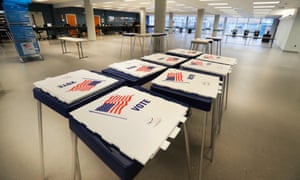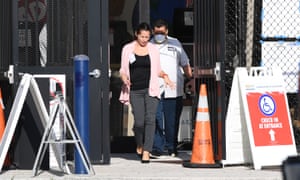Primaries have been delayed and conventions are in question as calls for voting by mail raise concerns of their own
- Coronavirus – live US updates
- Live global updates
- See all our coronavirus coverage

Photograph: David Maxwell/EPA
When Spelman College announced this month it was suspending in-person classes and closing residence halls in response to coronavirus, Ashee Groce, a junior, had a question: how would she vote?
Groce, who serves as president of Young Democrats of America at Spelman, had registered herself and a number of fellow students in the Atlanta area. But they had now lost their housing and would have to return home before Georgia’s presidential primary.
On a press call for the not-for-profit Rock the Vote, Groce said she was grateful Georgia was one of the states that have delayed their primaries, giving her more time to figure out how to cast a ballot, but those decisions have sparked their own set of concerns.
As the coronavirus outbreak spreads across America, it is wreaking havoc in an election year as Democrats pick a champion to try to oust Donald Trump from the White House.
But at least 15 Democratic primaries have now been delayed because of coronavirus, essentially freezing the Democratic nominating contest – currently dominated by the former vice-president Joe Biden. While state officials scramble to find safe ways for voters to cast their ballots, voting rights advocates warn that lawmakers will have to do considerable work to ensure the pandemic does not derail the presidential election.
The delayed primaries are admittedly unlikely to change the final outcome of the Democratic race, considering Biden’s significant delegate lead over his rival, the democratic socialist senator Bernie Sanders. But the country’s necessary focus on coronavirus has left Biden mostly on the sidelines as he tries to pivot to his likely match-up against Donald Trump in November. The status of the party’s summer nominating convention also appears to be up in the air, which could rob Biden of another key opportunity to make his pitch to voters to choose him over Trump.
Asked last week whether the convention should be canceled, Biden said no. “I don’t think it should be called off, and I don’t think we should call off any of the elections,” the candidate told CNN’s Jake Tapper. “I think we just have to move forward. We may have to use different means and methods. There’s an awful lot of direct mail voting going on right now, which may be one of the answers.”
The Democratic National Committee chairman, Tom Perez, sent a similar message this month after Ohio canceled in-person voting at the last minute over concerns about spreading coronavirus at polling places. Perez said in a statement that states should focus on expanding no-excuse absentee voting and vote by mail “instead of moving primaries to later in the cycle, when timing around the virus remains unpredictable”.
Democrats, who have long pushed for more absentee voter options, said the 17 March primaries in Florida, Illinois and Arizona demonstrated the need to expand such efforts in the face of coronavirus. Illinois, which relies mostly on in-person voting, saw a 25% decrease in turnout that was largely attributed to voters’ concerns about the spread of coronavirus. But Florida and Arizona, which both have robust early voting and vote by mail operations, actually saw increases in overall turnout.

Sean Eldridge, the founder of the progressive group Stand Up America, said postponing primaries was unavoidable because so many states lack appropriate voting protocols to deal with such crises. “I think every state is going to have to make that choice right now, but the problem is too many states are not prepared for this moment,” Eldridge said.
Eldridge’s group drove more than 70,000 constituent calls to lawmakers urging them to include funding to expand no-excuse absentee voting and vote by mail in the $2tn coronavirus package.
“None of us know how long this pandemic is going to last, and we need to make sure every single eligible voter is able to cast their ballot,” Eldridge said. “If Congress provides sufficient funding to the states, then states can put that infrastructure in place now to address the coronavirus pandemic but also to be prepared for future events that could disrupt future elections.”
But experts emphasize that states will need to develop a safe in-person voting option to ensure fair elections in the months to come.
Certain people, such as those who are homeless or living on a Native American reservation, may not have reliable access to mail, so an entirely mail-based election could leave them behind.
“There are these communities that get already wronged by our system, and they’re already getting underresourced,” said Myrna Perez, the director of the voting rights and elections program at the Brennan Center for Justice. “Relying on the mail in that way would just bake in those existing inequalities.”
Perez urged states to set rigorous sanitization standards for polling sites and ensure voters can practice social distancing while casting in-person ballots, so Americans can protect their health while voting.
“We need many, many different options ready to go because we’re going to have many diverse communities that need to get served, and there’s not going to be one way that is able to serve them all,” Perez said.
The Brennan Center has estimated it will cost up to $2bn to ensure the fairness of elections during the pandemic, but the coronavirus stimulus bill allocates only $400mn for election assistance. Voting rights advocates and Democratic lawmakers described the funding as an encouraging sign, especially considering Senate Republicans allocated $140m for election assistance in their initial proposal, but they say they are not done fighting for a more robust response.
“We all know that this pandemic has been a threat to our economy, to our health and to our democracy,” Eldridge said. “It’s important that Congress respond on all three of those fronts.”




